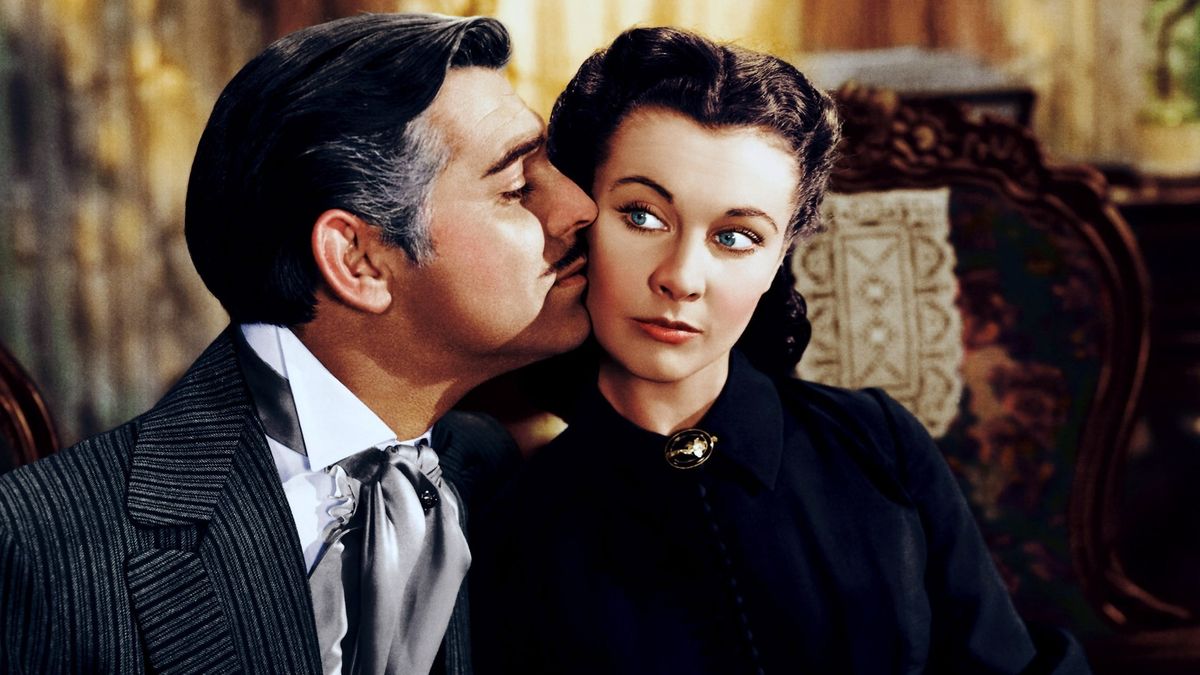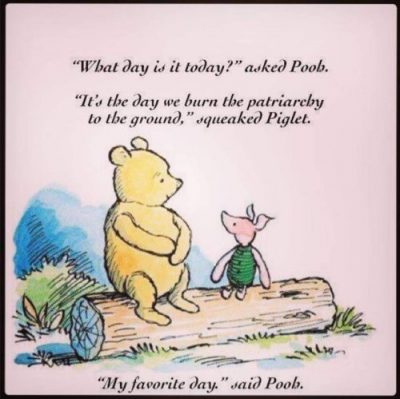Despite the pronounced lack of happily ever after, Gone With the Wind is on a lot of people’s lists as a romance novel. So it’s no surprise that there are a dozen different romance tropes in Gone With the Wind. Several are subverted, as you’ll see below, and there’s a big one missing: the Grovel!
Let’s take a look at romance tropes in Gone With the Wind…
1. She doesn’t consider him a romantic possibility, but he is strangely attractive.
Scarlett never considers Rhett a romantic possibility until the final scenes of the book, on account of believing herself to be in love with Ashley Wilkes for 98% of the story. But Rhett is the one she can talk to…
“Sometimes she thought that all the people she had ever known were strangers except Rhett.”
“Talking to Rhett was comparable only to one thing, the feeling of ease and comfort afforded by a pair of old slippers after dancing in a pair too tight.”
2. She doesn’t even want to get married.
At the opening of the book, Scarlett wants nothing more than to be married, but once her first marriage – and child – have happened, she wants nothing more of it.
3. He’s a rake ready to be reformed.
Rhett is a well-known scamp, known to have ruined a young lady and then killed her brother in a duel, leading to his expulsion from Charleston society and extensive side eye from Atlanta society. He’s also well-known as a patron of high class madam Belle Watling.
4. No one’s ever told him ‘No’ before.
As Rhett tells Scarlett, he’s accustomed to getting what he wants.
Oh, I’ve never denied coveting you, if that’s what you mean. But thank God, I’m not bothered about matters of honor. What I want I take if I can get it, and so I wrestle neither with angels nor devils.
5. He’s not ready to marry…until he meets her.
Rhett’s first proposition to Scarlett is that she become his mistress, as he’s not the marrying kind.
You can tell your curious friends that when I marry it will be because I couldn’t get the woman I wanted in any other way. And I’ve never yet wanted a woman bad enough to marry her.
His attitude her is definitely reminiscent of Mr B in Pamela, but Rhett does not attempt any of Mr B’s terrible behavior and the character of Scarlett O’Hara is certainly a polar opposite of Pamela Andrews!
6. SUBVERTED: Danger is the catalyst to realizing love.
Mitchell subverts this trope cleverly, using it to demonstrate Scarlett’s ruthless nature when she visits Rhett in prison and plays on his emotions while seeking his money to save Tara from tax collection. Rhett, facing death by hanging, is initially taken in by Scarlett’s claim that the danger has made her realize feelings for him.
“Oh, Rhett, I’d die if they hanged you! I couldn’t bear it! You see, I—” And, because she could no longer sustain the hot leaping light that was in his eyes, her lids fluttered down again. In a moment I’ll be crying, she thought in a frenzy of wonder and excitement. Shall I let myself cry? Would that seem more natural?
He said quickly: “My God, Scarlett, you can’t mean that you—” and his hands closed over hers in so hard a grip that it hurt. She shut her eyes tightly, trying to squeeze out tears, but remembered to turn her face up slightly so he could kiss her with no difficulty.
7. SUBVERTED: The Spiteful Other Woman
Another common trope subverted by the very structure of the novel: Scarlett is the Spiteful Other Woman to Melanie’s love story with Ashley.
If only Ashley were her husband, instead of Melanie’s, how sweet it would be to go to him and lay her head upon his shoulder and cry and shove her burdens onto him to work out as best he might.
8. He’s going to buy her all the pretty things.
During the war, Rhett brings her a new bonnet from France, which is nice enough. But once they’re married and on honeymoon in New Orleans…
More exciting than the people she met were the frocks Rhett bought her, superintending the choice of colors, materials, and designs himself. … And the delicate convent-made underwear! How lovely it was and how many sets she had! Chemises and nightgowns and petticoats of the finest linen trimmed with dainty embroidery and infinitesimal tucks. And the satin slippers Rhett bought her! They had heels three inches high and huge glittering paste buckles on them. And silk stockings, a dozen pairs and not a one had cotton tops! What riches!
9. A choice between impractical passion or passionless practicality.
In the course of the novel, Scarlett marries three times. Each time she is taking an option other than the passion she believes she feels for Ashely Wilkes, but her second marriage to Frank Kennedy is the most obvious example of passionless practicality. See Jane Eyre for another explicit decision between impractical passion or passionless practicality.
10. She’s never known love…until he wakes the passion within her.
Here’s her conversation with Rhett when he proposes marriage to her:
“It’s fun for men—though God knows why. I never could understand it. But all a woman gets out of it is something to eat and a lot of work and having to put up with a man’s foolishness—and a baby every year.” He laughed so loudly that the sound echoed in the stillness … “You know it’s true. Fun! Fiddle-dee-dee!”
“I said you’d had bad luck and what you’ve just said proves it. You’ve been married to a boy and to an old man. And into the bargain I’ll bet your mother told you that women must bear ‘these things’ because of the compensating joys of motherhood. Well, that’s all wrong. Why not try marrying a fine young man who has a bad reputation and a way with women? It’ll be fun.”
And then, of course, he kisses her.
“His insistent mouth was parting her shaking lips, sending wild tremors along her nerves, evoking from her sensations she had never known she was capable of feeling.”
Bonus! 11. Death Preferable to Loss of Virtue
This concept, so prevalent in Pamela, gets a brief mention on one of the many occasions when Rhett hopes to disillusion Scarlett about her feelings for Ashley. This is discussing when she came to Rhett to get money for taxes for Tara, ready to become his mistress in return:
“If he loved you, then why in hell did he permit you to come to Atlanta to get the tax money? Before I’d let a woman I loved do that, I’d—”
“He didn’t know! He had no idea that I—”
“Doesn’t it occur to you that he should have known?” There was barely suppressed savagery in his voice. “Loving you as you say he does, he should have known just what you would do when you were desperate. He should have killed you rather than let you come up here—and to me, of all people! God in Heaven!”
But I also note that Scarlett considers death only once, and not about her virtue:
“Weary with dread, she felt that she would rather kill herself than try to make a new beginning.
Missing: The Grovel
Neither Rhett nor Scarlett are willing to admit vulnerability to each other. Rhett cannot admit any weakness to Scarlett for fear that she’ll use it against him. Scarlett cannot admit any weakness because of her persistent habit of ignoring what’s in front of her face with regard to emotion — she has a repeated refrain of “I’ll think about it later” and by the time she does get around to really thinking through her feelings about Rhett, it’s far too late for a grovel to be effective.
“But if she wrote him he’d think she wanted him to come home and he would be amused. And he mustn’t ever think she wanted him of needed him.”
I’d say the inablity to grovel is what costs Rhett and Scarlett their happily ever after, which is an excellent example of why it’s such an important part of the romance genre.



